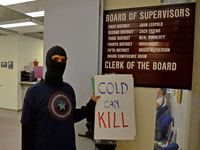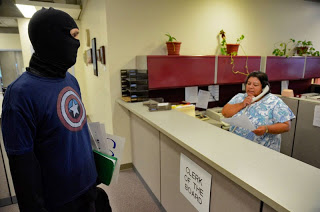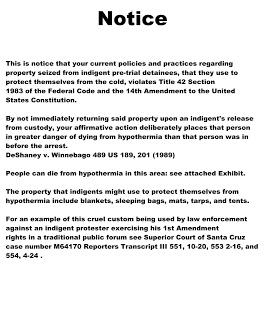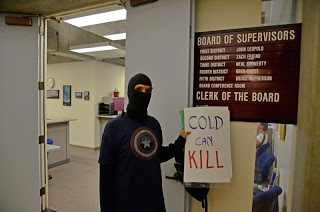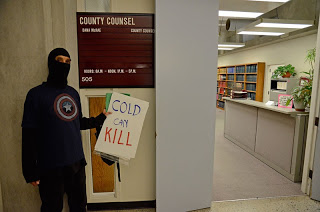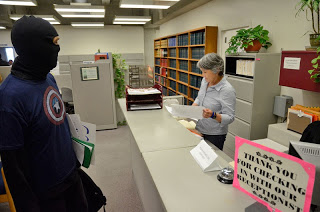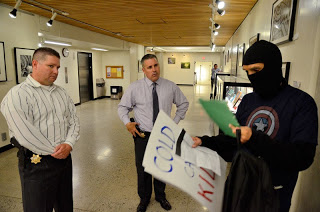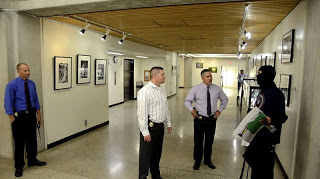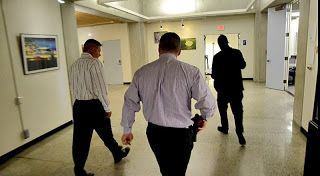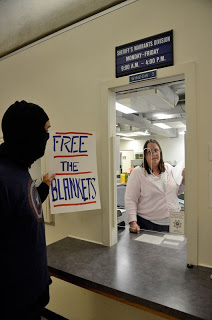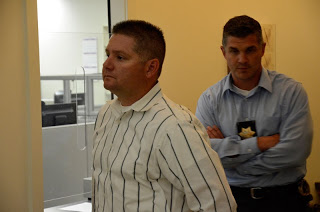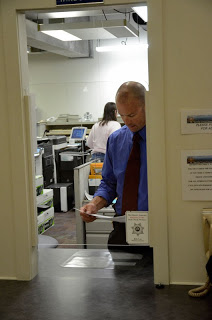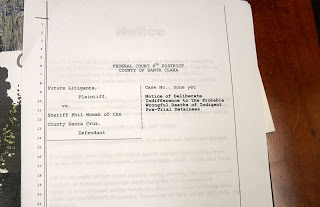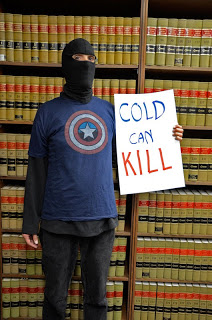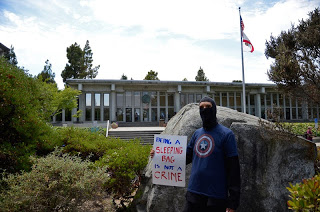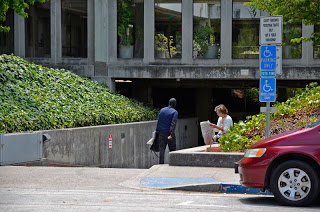Activist Says Property Seizure is Designed To Harass Homeless Out of Santa Cruz.
On July 3, an activist served representatives of the Santa Cruz County government with a written notice stating that the Sheriff department’s policy of seizing the property of pre-trial homeless detainees violates federal code and the United States Constitution. The notice was accepted, and the activist believes that if a lawsuit is brought against the county, the authorities can not assert that they were unaware of the dangers they subject the homeless to. The activist served the notice wearing a face mask, believing strongly that individuals have the right to serve branches of the government with legal papers anonymously.
“By not immediately returning said property upon an indigent’s release from custody, your affirmative action deliberately places that person in greater danger of dying from hypothermia than that person was in before the arrest,” the notice read.
The notice was submitted to the county with a legal brief styled cover letter which listed a plaintiff as “future litigants” and a defendant as Sheriff Phil Wowak. It was titled, “Notice of Deliberate Indifference to the Probable Wrongful Deaths of Indigent Pre-Trial Detainees.”
“The practice of keeping property, that the homeless need to survive, for several days or weeks, is yet another tactic used by law enforcement to harass the homeless out of town. Unlike other tactics though, this one can lead to homeless deaths from exposure and hypothermia. I believe there were four homeless deaths from hypothermia in Santa Cruz in 2010,” the activist stated in a press release.
In the notice, the activist referenced the Santa Cruz Superior Court case brought against Gary Johnson in 2012. That case featured testimony detailing the seizure of Johnson’s property during a sleep demonstration that Johnson undertook in 2011 and 2012 to protest the local ban on sleep at the county court house. When Johnson was arrested during a multiple evening sleep demonstration by Sheriff’s deputies with the county, his possessions were confiscated. When he was released from the Santa Cruz County jail at 10pm, he was left with none of his possessions when confronting another evening of sleeping outside.
In his notice to the county, the activist referred to the seizure of Johnson’s property as a, “cruel custom being used by law enforcement against an indigent protester exercising his 1st Amendment rights in a traditional public forum.”
The local activist, who wished not to be identified, donned a face mask before entering several offices in Santa Cruz county’s government building on Ocean Street during the afternoon of July 3. He said the action was in solidarity with Peace Camp 2010 and Occupy Santa Cruz, where homeless gear was destroyed by authorities in efforts to clear the protest camps from public space.
The activist self-identifies as an “American revolutionary.”
He described wearing the mask as a “Black Bloc” tactic. In the press release, the individual further explained that activists in Santa Cruz who “challenge law enforcement misconduct” later become targeted by the police.
The activist gathered first for a photo opportunity in the Santa Cruz County Law Library, which is located on the bottom floor of the County Government Center. He held a protest sign that said “Cold Can Kill” in front of some of the library’s legal texts.
He then visited the offices of the County Board of Supervisors and County Counsel in order to serve the notice.
A worker in the County Counsel office accepted the notice with very little comment. The clerk at the Board of Supervisor’s office was having some trouble discerning what type of legal document the notice was when the activist served it there, and the woman working called another department on the phone attempting to determine if the notice had been served there yet.
The activist cut the process short and said, “Well, you have been served.”
As he was leaving the Board of Supervisors office, four plain-clothes members of law enforcement wearing badges from the Sheriff’s office arrived, two of whom were wearing hand guns in belt holsters.
“May I ask your name?” one of the deputies said.
“I would like to remain anonymous,” the activist responded.
One of the deputies had his hand on his gun.
“Sir, we are getting some phone calls of people concerned because of the mask. Is there a need to have the mask on?”
“I’m not doing anything unlawful,” the activist responded.
“I’m not saying that,” the deputy replied. “I’m just saying that people are concerned, obviously, when they see the mask.”
The activist explained that he wanted to serve the Sheriff’s department with a legal notice. Deputies asked if there was anything they could do, and attempted to determine if the document was something they could officially accept as part of their specific duties with the department. After some back and forth, the deputies suggested they walk downstairs to their department.
A deputy then made another attempt to get the activist’s name, explaining, “it’s just that mask thing gets a lot of attention.”
“That’s why I did it,” the activist responded.
While walking with the individual to the Sheriff’s Warrants Division, the deputy holding his gun continued to do so as he followed the activist.
In the hallway of the Warrants Division, the discussion about whether the deputies could personally accept the document was repeated. They asked what type of document it was and the activist replied that it was a “Notice of Deliberate Indifference.” They then referred him to the counter.
“Lets check with records, that way you have official service,” one of the deputies said.
At the counter, a staff member quickly accepted the document.
Sheriffs concluded their interactions with the activist at that point, and he left the building without being physically followed.
When outside of the government building, the activist made his way to the final photo-op location, which was an area outside of the court house where Gary Johnson held his sleep protest in 2011-12.
There, the activist held a sign that said, “Being a sleeping bag is not a crime.”
The notice the activist served the county was titled “Notice of Deliberate Indifference to the Probable Wrongful Deaths of Indigent Pre-Trial Detainees,” and read, in full, as follows:
“This is notice that your current policies and practices regarding
property seized from indigent pre-trial detainees, that they use to protect themselves from the cold, violates Title 42 Section
1983 of the Federal Code and the 14th Amendment to the United States Constitution.
“By not immediately returning said property upon an indigent’s release from custody, your affirmative action deliberately places that person in greater danger of dying from hypothermia than that person was in before the arrest.
DeShaney v. Winnebago 489 US 189, 201 (1989)
“People can die from hypothermia in this area: see attached Exhibit.
“The property that indigents might use to protect themselves from hypothermia include blankets, sleeping bags, mats, tarps, and tents.
“For an example of this cruel custom being used by law enforcement
against an indigent protester exercising his 1st Amendment
rights in a traditional public forum see Superior Court of Santa Cruz case number M64170 Reporters Transcript III 551, 10-20, 553 2-16, and 554, 4-24 .”
Alex Darocy
http://alexdarocy.blogspot.com/
Source : http://www.indybay.org/newsitems/2013/07/08/18739525.php
